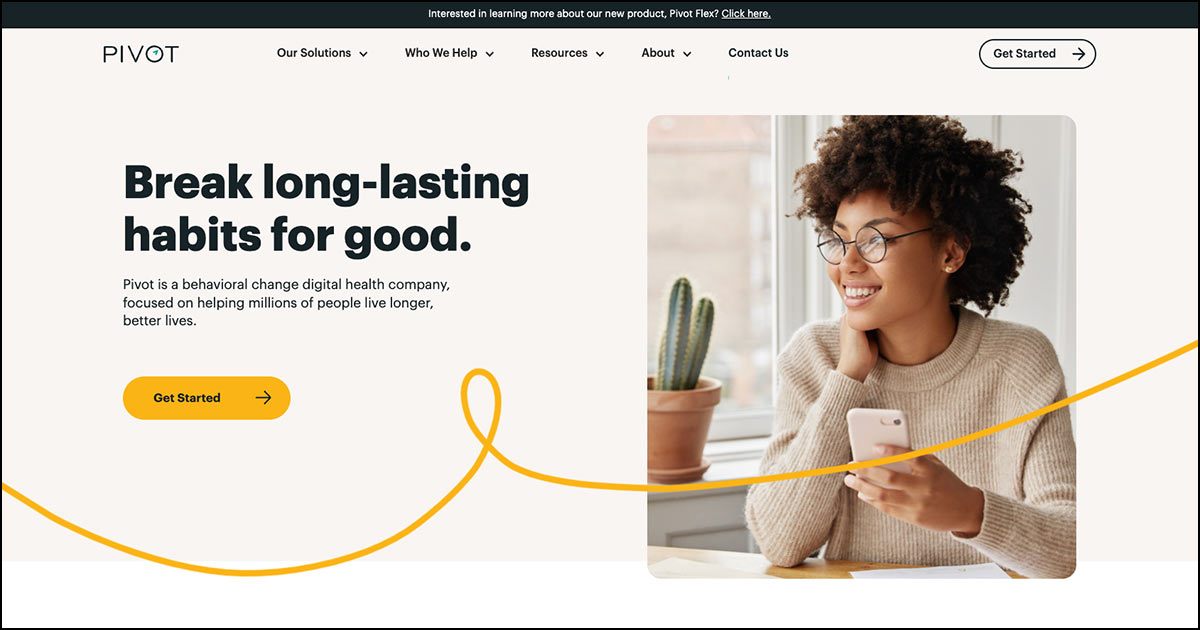Pivot: Working With Smokers to Quit for Good
The Origin Story of Pivot

Last Updated: By TRUiC Team
Smoking is a notoriously difficult habit to break. That’s the bad news. The worse news is that lifelong smokers face major health risks such as cancer. In fact, lifetime tobacco users will die more than 55 percent of the time from complications related to their habit. While programs that purport to help people quit tobacco use are plentiful, most of them don’t yield very good results. David S. Utley, M.D., thinks his startup Pivot will have more success by using proven techniques like cognitive behavioral therapy to help nicotine users stop for good.
This is Pivot’s origin story.
Former Cancer Surgeon Becomes a Founder
Prior to founding BARRX and Pivot, David was a head and neck cancer surgeon at Stanford Medical Center. That experience gave him plentiful first-hand knowledge of how dangerous smoking and other forms of tobacco use are. "Tobacco use, [in] all forms… is the leading cause of preventable death and illness on the planet,” he says. “When I was at Stanford… for 11 years as a head and neck cancer surgeon, all of our patients used tobacco. And therefore, in mid- to late life, [they] developed advanced cancers related to tobacco. We operated on them and did everything we could to preserve quality life and extend life.”
While those efforts were admirable, they shouldn’t have been necessary. According to David, tobacco-related cancers are “completely preventable if you had good upstream preventive services like tobacco cessation.” Such services are sorely lacking, however, as most of them “require that you join and set a quit date in the next two weeks and quit, and then they cut you loose,” he says.
One tragic result is that over the past three years, about three times as many people died from tobacco use as died from covid. “We talked about the pandemic, and we talked about the Operation Warp Speed, and we talked about vaccinations for all, but we're not doing anything for something that's three times more mortal,” David says. “After building [Pivot] for the last seven years, we believe we can fix that.”
Evidence-Based Strategies
How is Pivot different? Unlike many similar programs, Pivot’s “tobacco cessation solution” called Pivot Breath thoroughly educates tobacco users about their habit. “We're trying to help people with evidence-based strategies learn about their tobacco use, because tobacco is not just smoking cigarettes,” David says. “It's also inhaling vaporized nicotine and chewing smokeless tobacco, and there's tons of [those products] around now.
When it comes to quitting, Pivot’s approach amounts to more than simply telling people to stop by an arbitrary date and providing emotional support. Instead, Pivot treats tobacco use like the chronic disease it actually is. “We believe that tobacco use is a chronic condition just like obesity, diabetes, mental health, musculoskeletal disease, cardiovascular disease, because it is,” he says. “It's a lifelong condition. We need to help folks from day one through their entire journey when they quit, and then help them stay quit.”
Pivot’s program draws on Department of Health and Human Services guidelines to learn “exactly what works and why people quit,” David says. In part, that means helping people identify what triggers them to use tobacco and encouraging them to switch to healthier coping mechanisms. The company offers trained coaches, Food and Drug Administration-approved nicotine replacement products, a mobile app that facilitates cognitive behavioral therapy, and other services to help clients stop smoking for good.
What's Next
David says he and his colleagues at Pivot have realized that they can use several of the techniques the company has developed for quitting tobacco – coaching, community support, behavioral change techniques, self-determination theory, and motivational interviewing – to help alleviate other problems like stress, anxiety, and burnout. To that end, the company is developing a program called Pivot Flex. Like Pivot Breath, Pivot Flex involves strategies such as dedicated coaching, validated emotional health scoring, and community support.
“I think we can take all of the things we've learned there – I know we can – and move that over into Flex and show that all of those same things work,” he says. “Because we're already helping people with stress and resilience every day, so that's the next big thing.”
Tell Us Your Startup Story
Are you a startup founder and want to share your entrepreneurial journey with our readers? Click below to contact us today!





